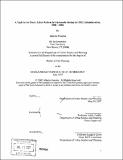A light in the dark : labor reform in Guatemala during the FRG administration, 2000-2004
Author(s)
Fuentes, Alberto (Alberto Jose)
DownloadFull printable version (8.042Mb)
Other Contributors
Massachusetts Institute of Technology. Dept. of Urban Studies and Planning.
Advisor
Judith Tendler.
Terms of use
Metadata
Show full item recordAbstract
Recent literature on Latin America has highlighted cases of reform by the region's governments to increase State regulation of the labor market, offset the detrimental effects of the so-called Washington Consensus, and promote economic development. In Guatemala however, the FRG Presidential administration (2000 - 2004) seemed an unlikely candidate for this task. Linked to the military and marked by a conservative record, the FRG administration was surrounded by scandals of corruption, poor national economic performance, soaring crime rates and eroding approval ratings. Surprisingly, while in power the FRG enacted and implemented the two far-reaching labor reforms that are the subject of this thesis. The first was a legal reform to the Labor Code and the second was an administrative reform of the Labor Inspection. Most importantly, the two reforms sought to increase State regulation over the labor market, and both had substantial effects in terms of enhanced State regulatory capacity. As the thesis argues, the FRG labor reforms were possible because, unlike the governments preceding (e.g. PAN) and following it (i.e. GANA), the FRG was able to exclude the largest private conglomerates in the country ("the Big Boys") and their followers in the national peak business organization CACIF from influencing and controlling the Executive branch of government. (cont.) In the past, the Big Boys and the CACIF wielded their power in the Executive to block similar labor reform attempts. Within the FRG Executive however, the FRG Ministers of Labor, supported by both the FRG Vice-President and the U.S. Ambassador in Guatemala, could push for the labor reforms without facing the obstacles that the Big Boys and the CACIF had represented in the past. Additionally, FRG leaders were eager to use the reforms to target political opponents, expand the party's constituency, and obtain recognition by the international community. Interestingly, as the thesis shows, many (although not all) of the FRG reforms survived the transition from the FRG to the Big Boy and CACIF-friendly GANA government in 2004. The explanation offered for this seeming paradox rests on an exceptional conjuncture: at the time, the U.S. Congress was deciding whether to extend free trade benefits to Guatemala under the United States - Dominican Republic Central America Free Trade Agreement (US-DR CAFTA or CAFTA), and one of the main points of contention was Guatemala's poor labor regulation enforcement record. The GANA party had to show that labor regulation enforcement in Guatemala had improved and to do so it used some of the FRG's labor reforms.
Description
Thesis (M.C.P.)--Massachusetts Institute of Technology, Dept. of Urban Studies and Planning, 2007. Includes bibliographical references (p. 123-128).
Date issued
2007Department
Massachusetts Institute of Technology. Department of Urban Studies and PlanningPublisher
Massachusetts Institute of Technology
Keywords
Urban Studies and Planning.